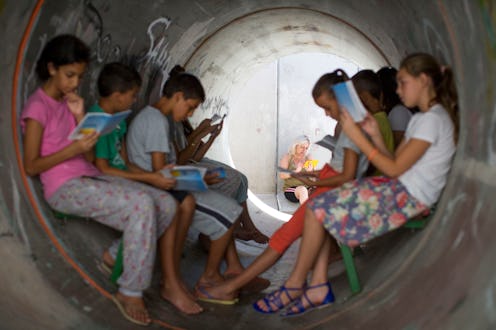Books
Elitism in Children's Lit? No Thanks
If there's one thing that should be spared the constant scrutiny and elitism of the outside world, it's children's books. But not everyone agrees. In an article titled "The Percy Jackson Problem," The New Yorker's Rebecca Mead explains her objection to the popular Percy Jackson and the Olympians series and the issue she seems to think it represents.
Among the sins that she views this children's book commits are the following: being written in language to which kids can actually relate; making children excited about reading it; telling jokes this age group finds hilarious; and not treating Greek mythology as a solemn, serious thing. (Strange — I don't remember the history in which the gods of Mount Olympus were only ever spoken of by the most intellectual and highly educated of the Ancient Greeks and never held any appeal whatsoever for the masses. It was a religion, after all; it had popular appeal.)
In this narrative, the Percy Jackson series and other books of its ilk — books written for children that they enjoy — aren't worthy of the attention of kids. And as for the writing? Well, Mead says, the Percy Jackson novels "make J. K. Rowling’s Harry Potter series seem as if it were written by Samuel Johnson."
Wait. Was that a dig at Harry Potter?
Seriously, though: If this is how some adults think about children's literature, I am both incredibly amused and a little concerned.
Mead laments how Percy Jackson books "seem positively contrived to repel adult readers, so thoroughgoing is their affectation of teen goofiness." She despairs that the companion book to the series retells Greek myths in "jaded teen argot that proves irresistibly cool to kids from grade school up" and that dares to sound both natural and modern as opposed to using proper "heightened, poetic language." She complains that young people treat authors like celebrities. She disagrees with the idea that we should encourage kids to read whatever they want so long as they're reading, her thoughts falling somewhere between those of a classics professor and Concerned Parent™.
On Twitter, other readers find Mead's argument... misguided, too:
On one hand, I can understand the impulse to worry about the sorts of things kids are reading. I still think about the impression that Twilight might have given a lot of kids about relationships. But I also liked the Twilight saga when I was a teenager, while still being able to recognize some of its problems. Perhaps, more importantly, at the same time I was reading Twilight I was also reading — for fun and of my own volition — things like The Odyssey, The Blind Assassin, The House of the Spirits, and Half of a Yellow Sun. So loving "jaded teen argot" does not disqualify anyone from loving literary language as well, not just later in life but simultaneously.
Kids are allowed to have multifaceted interests. Kids are allowed to have their own taste in books. Kids are not just allowed but should be encouraged to read books they love and enjoy, whatever those books may be. Reading is not a chore; reading is amazing and illuminating and fun, and that's what we should be showing children. But you cannot force anyone to love something. The surest way to forever kill off literary culture in America is to make sure all children are only given books that adults also enjoy and approve of; everyone will grow up hating to read, and no one will touch a book once graduating school.
That's not a future I like the look of.
Books written for children should be written for children, and they not only can but should differ greatly from books adults enjoy. At least I think that sounds reasonable.
So can we all agree to keep the elitism out of children's literature, and generally let young people grow and develop a love of reading on their own? Because that would be ideal.
Image: Giphy
